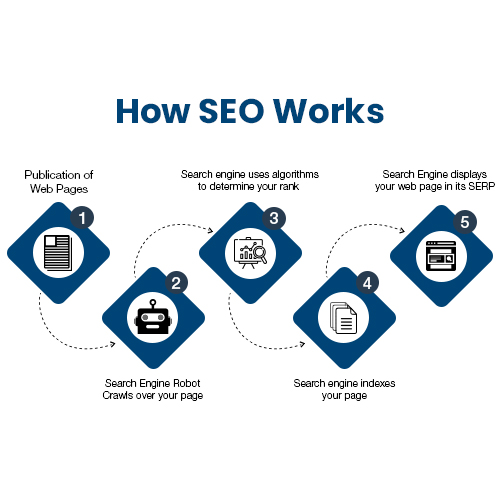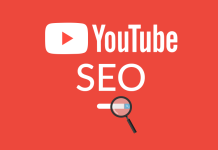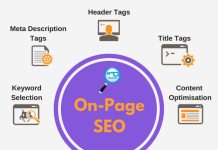Welcome to our comprehensive guide on SEO, where we demystify the world of Search Engine Optimization. In the digital age, SEO is a crucial component of your online success. If you’re wondering, “What is SEO, and how does it work?” – you’re in the right place.
Why SEO Matters in the Digital Age
In today’s fast-paced, information-driven world, online visibility is key. Whether you run a blog, an e-commerce site, or a corporate webpage, SEO plays a fundamental role in helping you reach your target audience. When you understand how SEO works, you can optimize your content and website to rank higher in search engine results, driving more organic traffic.

The Importance of Understanding SEO Principles
SEO isn’t just for experts and tech-savvy professionals. It’s a skill that anyone who wants an online presence should grasp. As we dive deeper into this guide, you’ll discover that SEO isn’t as complex as it might seem. By the end of this article, you’ll be well-equipped to apply SEO principles to your online platform, increasing your website’s visibility and your chances of success.
A Brief Overview of What This Guide Will Cover
In this guide, we’ll break down SEO into its fundamental components, making it easy to understand. We’ll explore the inner workings of search engines, discuss keyword research and on-page SEO strategies, and even delve into the world of off-page SEO techniques. Whether you’re a beginner looking for a solid foundation or a seasoned pro seeking to refine your knowledge, this guide is your roadmap to SEO success.
SEO Fundamentals
Defining SEO
When people ask, “What is SEO?” it’s all about optimizing your online content and website to rank higher on search engines like Google. The primary purpose is to improve your website’s visibility and make it more appealing to search engine algorithms.
SEO, or Search Engine Optimization, involves a range of practices aimed at enhancing the quality of your online content and making your website more accessible to search engine crawlers. By understanding how SEO works, you can fine-tune your content to meet the requirements of search engine algorithms, thereby improving your site’s chances of appearing at the top of search results.
On-Page SEO
To answer the question, “How does SEO work?” we need to look at the nitty-gritty details. On-Page SEO focuses on optimizing individual web pages, ensuring that they are more attractive to search engines.
A crucial part of On-Page SEO is optimizing your content, including the strategic placement of keywords, meta tags, and header tags. This not only helps search engines understand what your content is about but also improves the user experience, which is equally vital for SEO success. We’ll dive deeper into these topics in this section.
Off-Page SEO
While On-Page SEO is essential, off-page SEO plays a pivotal role in determining your website’s overall authority and trustworthiness. The significance of off-page SEO lies in building a robust online presence through quality backlinks.
Off-Page SEO goes beyond your website and involves activities like link building, social media engagement, and reputation management. We’ll discuss these strategies in detail to help you understand how to build a strong online presence that search engines value, ultimately improving your rankings.
How Search Engines Work
Search Engine Basics
To comprehend how SEO works, it’s crucial to grasp the basics of search engines and their role in information retrieval.
Search engines are the gateways to the vast sea of information on the internet. The three main players in the search engine world are Google, Bing, and Yahoo. These search engines employ complex algorithms to determine the relevance and quality of web pages. Understanding their differences and intricacies is vital for SEO success.
Crawling and Indexing
Search engines use a process known as crawling and indexing to find and store web pages. These are fundamental steps in the operation of search engines.
Crawling involves search engine bots systematically scanning websites to collect data about the content. To ensure your website is thoroughly indexed, you can use tools like robots.txt and XML sitemaps, guiding search engines on which pages to crawl and index. We’ll delve deeper into these techniques in this section.
Ranking and Algorithms
Search engine algorithms are the secret sauce that determines the order of search results. It’s essential to understand how these algorithms work and what they prioritize.
Google’s PageRank, among others, is a significant algorithm that influences your website’s position in search results. To rank on the first page of Google, you must align your content with these algorithms. We’ll explore these algorithms and offer insights on how to optimize your content accordingly.
On-Page SEO Optimization
Content Quality
Content quality is at the heart of SEO success. Your content not only needs to be informative but also engaging and original.
Creating valuable and engaging content is the key to keeping your visitors on your page and reducing bounce rates. We’ll explore the elements of high-quality content and how it directly impacts SEO.
Meta Tags and Descriptions
Optimizing your meta tags and descriptions is another crucial aspect of on-page SEO. These elements provide a brief snapshot of your content in search engine results.
We’ll discuss the best practices for crafting compelling meta tags and descriptions. By making them enticing and informative, you can improve click-through rates and increase your website’s visibility.
Header Tags
Header tags are not just for organizing your content; they are essential for SEO. They help search engines understand the structure of your page.
Properly structured content with H1, H2, and H3 tags not only improves user-friendliness but also helps search engines navigate your page effectively. In this section, we’ll explore how to use header tags for both user experience and SEO benefits.
Internal Linking
Internal linking is an often overlooked on-page SEO technique that can significantly improve your website’s performance.
By connecting your content through internal links, you can enhance user experience and improve your SEO. We’ll delve into the best practices for internal linking, helping you create a well-structured linking strategy that benefits both your visitors and search engines.
Off-Page SEO Strategies
Link Building
Link building is a core component of off-page SEO, and it can significantly influence your website’s authority and search engine rankings.
Effective link building involves acquiring high-quality backlinks from other reputable websites. In this section, we’ll discuss various strategies, including guest posting, outreach, and content collaboration, to help you build a strong backlink profile that boosts your online authority.
B. Social Media
Social media isn’t just for sharing cat videos; it plays a crucial role in off-page SEO. Social signals can impact search engine rankings.
Leveraging social platforms like Facebook, Twitter, and Instagram can help increase your website’s visibility. We’ll explore how to effectively utilize social media to drive traffic and improve your search engine rankings.
Online Reputation Management
Maintaining a positive online reputation is vital in today’s digital landscape. Your online reputation can influence how search engines perceive your website.
We’ll delve into online reputation management, providing insights on how to monitor and improve your online reputation, respond to reviews, and effectively manage online feedback for SEO benefit.
Technical SEO
Site Speed and Mobile Friendliness
Technical aspects of SEO are often overlooked but crucial for ranking success. Site speed and mobile-friendliness are two such aspects that can significantly impact your SEO efforts.
Fast-loading web pages provide a better user experience and can contribute to higher search engine rankings. Additionally, ensuring your website is mobile-friendly is a must, as Google considers mobile compatibility as a ranking factor. We’ll provide insights on optimizing your site for speed and mobile users.
XML Sitemaps and Robots.txt
XML sitemaps and robots.txt files are essential tools that guide search engine crawlers, ensuring they index your website effectively.
These technical aspects play a role in how search engines crawl and index your site. We’ll explain their importance and how to implement them correctly for maximum SEO benefits.
Schema Markup
Schema markup is a powerful tool for enhancing your search results. It helps search engines understand the content on your page better, resulting in rich snippets and improved visibility.
We’ll explore how to use schema markup to provide structured data to search engines, allowing them to display rich snippets in search results, which can increase click-through rates and user engagement.
Monitoring and Analytics
Tracking SEO Performance
Regularly monitoring your SEO performance is crucial to assess the effectiveness of your strategies.
Using tools like Google Analytics and other SEO analytics platforms, you can measure key metrics that indicate the success of your SEO efforts. We’ll discuss these metrics and how to use them to refine your SEO strategy.
Regular SEO Audits
SEO isn’t a set-it-and-forget-it endeavor. Regular SEO audits are essential to identify issues and opportunities.
We’ll delve into the importance of routine SEO audits and guide you on how to identify and rectify issues that might be affecting your rankings, ensuring your SEO strategy remains effective.

FAQs
A. What Are the Most Important SEO Ranking Factors?
Search engines consider a multitude of factors when determining rankings, but some key ones include content quality, backlinks, site speed, and mobile-friendliness.
B. How Long Does It Take to See SEO Results?
The time it takes to see SEO results varies, but typically, it can take several months to start noticing significant changes. SEO is a long-term investment.
C. Is SEO Only About Google?
While Google is the dominant search engine, optimizing for other search engines like Bing and Yahoo can also be valuable. However, most SEO efforts are geared towards Google.
D. What Is the Difference Between On-Page and Off-Page SEO?
On-Page SEO focuses on optimizing individual web pages, while Off-Page SEO involves activities like link building and reputation management that occur outside your website.
E. What Tools Can Help with Keyword Research?
Tools like Google Keyword Planner, SEMrush, and Ahrefs are valuable for keyword research. These tools provide insights into keyword search volume and competition.
F. How Can I Recover from a Google Penalty?
Recovering from a Google penalty involves identifying the cause, making necessary changes, and submitting a reconsideration request to Google.
G. What Is Local SEO, and Why Is It Important?
Local SEO is about optimizing your website to appear in local search results. It’s vital for brick-and-mortar businesses and services that serve a specific geographic area.
H. How Do I Measure the ROI of My SEO Efforts?
You can measure the ROI of your SEO efforts by tracking metrics like organic traffic, conversion rates, and revenue generated from organic search.
As we wrap up this comprehensive guide to SEO, you’ve journeyed through the intricate world of Search Engine Optimization. You now have the knowledge to answer the question, “What is SEO, and how does it work?”
Throughout this guide, we’ve covered the fundamental principles of SEO, the inner workings of search engines, the importance of keywords, and a range of on-page and off-page SEO strategies. We’ve also delved into the technical aspects of SEO, monitoring your SEO performance, and provided answers to frequently asked questions.
The future of SEO is ever-evolving, with search engines continuously updating their algorithms. Staying updated with industry changes is crucial, as it allows you to adapt your strategy for optimal results.
Armed with this newfound knowledge, you’re well-prepared to apply SEO principles to your online platform, boost your website’s visibility, and reach the coveted first page of Google. Now, it’s time to put your SEO skills to work and embark on the journey of online success.




